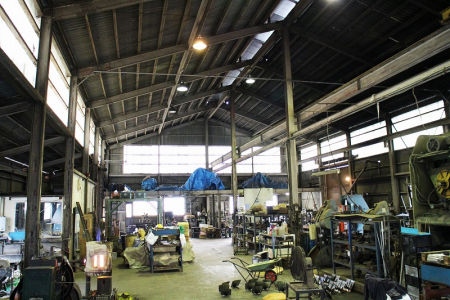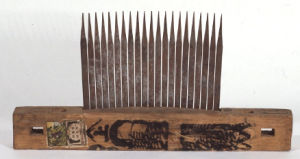- Home
- Shop by Brand
- Yashima Nogu Kogyo / Tottori
Yashima Nogu Kogyo / Tottori
 |
| Plenty of room - the Yashima shop floor |
The San'in region in west Japan was long a major centre of tamahagane jewel steel production, thanks to the abundance of high-quality iron sand and charcoal supplied by the region's rich forests. In Kurayoshi city the quality of the iron was particularly good, and over centuries agricultural blacksmiths (no-kaji) and swordsmiths (katana-kaji) flourished with the use of locally produced steel.
One particular product stands out in the history of Kurayoshi's metallurgical story: the 'inakoki senba', a tool used for threshing harvested ears of rice. Originally these had teeth made of bamboo, but Kurayoshi's 'rice-handling thousand-tooth knife' could thresh a large amount of unhulled rice with very little effort, thus dramatically improving agricultural productivity. Big demand, big business, lots of blacksmiths.
 |
| An inakoki senba - one of many |
From the late Edo period to the Meiji period, Kurayoshi blacksmiths forged 50,000 thousand blades a year and 80% of all threshing blades in Japan were from Kurayoshi. As with many aspects of Japanese culture, there's more to it than meets the eye and the inakoki senba wasn't simply a one-size-fits-all product. Blades were forged to suit the way the rice ears formed in different climates in different regions.
Yashima Nogu Kogyo Kabushiki-gaisha ('Yashima Agricultural Tool Manufacturing Company Ltd') was founded in 1890 and thus the company was a bit late to the game. The inakoki senba was Yashima's cornerstone product for its first decades but time and technology marched on and the invention of the foot-pedal threshing machine forced most local blacksmiths to abandon operations. Yashima instead pivoted to producing forged tools for agriculture. Again, a hoe is not just a hoe and after over 130 years in business, Yashima Nogu Kogyo continues to receive orders from all over western Japan for forged tools custom tailored to the climate and soil of each region.
Yashima doesn't produce kitchen knives in-house. You read that right. Smith networks run deep however and the company offers its customers a range of solid offerings at great prices, from partner companies in Tosa and Echizen. Hand-forged Japanese sharpness. It's what we like.
 Loading... Please wait...
Loading... Please wait...










